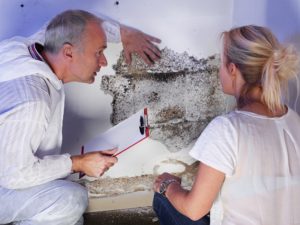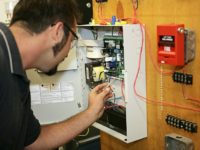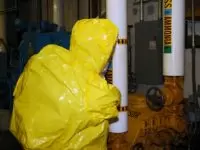
Mold Remediation Technicians are tasked with ensuring that human health is not affected by damp in a building.
What Does a Mold Remediation Technician Do?
Mold can grow in any building, but is most common in older buildings when technology wasn't quite as efficient at coping with damp. This can be almost any building, but most commonly in residential and commercial premises. There are state, Federal and international laws on mold and damp as it is a public health issue. Molds are fungi - some of which are hazardous to human health and environmental health. Damp can cause asthma, eczema and aggravate allergies at the very least. Serious conditions include pneumonia and infection.
The job of a Mold Remediation Technician is to identify and analyze these air quality hazards and suggest or make improvements to the mold remediation system of a building. This could be preventative or it could be curative when a problem has been identified. They can make recommendations on installing or improving extractor fans, or simply advise employees to open the windows. They can also work with buildings engineers to improve the structure of buildings to allay the worst problems of damp in buildings.
Where Does a Mold Remediation Technician Work?
They are a type of hazardous material abatement or removal technician and therefore can and will work in any buildings environment. They are also industrial hygienists that work in commercial and residential properties. No specific data exists for Mold Remediation Technicians, so the same data for industrial hygiene has been used. This is a group of health and safety workers who perform similar tasks and work at the forefront of internal environmental protection.
Around 20% of Mold Remediation Technicians work in state and local government. Typically, they will work as state employees tasked with examining publicly owned buildings and ensuring that mold does not become a problem. This will include government buildings, schools and historic buildings (because typically these buildings are poor at coping with damp). Around 11% work for Federal government, monitoring Federal buildings, but also for the CDC and other public health bodies.
Around 16%, that is 1 in 6, works in industry. These buildings require good ventilation systems for a variety of reasons - particles (not just mold) need to be cleared from a work environment.
10% work in technical services as a profession. These work for businesses or on a freelance basis, providing advice and writing reports for realtors (ahead of a building sale), developers (to explain what needs doing), legal (when a property owner has broken the law on environmental health) and so on.
What Is the Average Mold Remediation Technician Salary?
Mold Remediation Technicians, who fall under the broader BLS category of hazardous materials removal workers, earned a median salary of $45,270 as of May 2020. The top 10% in the profession earned about $76,570 during this time.*
Mold Remediation Jobs & Job Description
A Mold Remediation Technician safely removes and secures mold from various locations within a home, commercial building or business. Like many technical jobs, a specialized skill set is required for a Mold Remediation Technician due to biohazard and equipment concerns and can include:
- Ability to work well as part of a team and follow direction from a supervisor
- Availability to be on-call in the event of emergency situations; hours of work may vary depending on company of work, location or specific industry
- Capability to perform physically demanding work, such as moving furniture or appliances during a household remediation job
- Capability to work overhead and on a ladder or scaffold for an extended period of time
- Competency to utilize, maintain and service various types of equipment required for mold remediation, such as fans and power tools
- Ability to perform work performed in varying temperatures; temperatures may be extreme
- Ability to properly use personal protective equipment and self-care to protect against biohazardous contaminant exposure
- Ability to provide excellent customer service and effective communication while performing mold remediation at work sites
- Willingness to partake in training seminars and complete required certifications
- Knowledgeable in mold identification and inspection; willing to work continually on professional development
- Determine moisture readings using moisture meters; regularly calibrate instruments
A Mold Remediation manager responds to emergencies and provides an assessment and estimation of the remediation required. The senior level position will utilize many of the same skills required for a Mold Remediation Technician and can also include:
- Possess extensive experience working in the mold remediation industry
- Skills to inventory personal protective equipment and sign off that the equipment is in good working order for technical teams
- Assign work orders to technicians and maintain organizational operations of company work orders
- Have excellent verbal, interpersonal, technical and written communication skills to customers to acquire new work orders and to provide direction to technicians at work sites
- Ensure that technicians are following company and OSHA policies and procedures
- Provide training to technicians at work sites
- Develop training programs using up to date equipment and MSDS information
- Ensure that technicians are adhering to safety protocols
- Provide assessment consultation to customers and clients regarding mold remediation and prevention
- Complete associated documentation, including observations, measurements, diagrams, and cost estimations at work sites
- Maintain reports of work completed
- Inspect equipment required for mold remediation and place replacement equipment orders when needed
What Is the Job Demand for Mold Remediation Technicians?
Demand for all industrial hygienists is expected to grow some 7% in the decade between 2020 and 2030.* This represents a growth of just half the normal expected demand for all jobs. The reason for this is the expectation that new technologies in building design could reduce the problems associated with mold and damp in general. As environmental performance comes to the fore, it is expected that individual roles such as this will give way to building condition generalist roles where candidates are expected to have a wider knowledge.
What Are the Education Requirements to Become a Mold Remediation Technician?
Mold Remediation Technicians typically need a degree in a public health related subject, occupational health and safety, or biology or botany (for understanding the effects and causes of mold in the workplace and residential spaces). High School students should focus their studies in the area of general sciences, particularly biology. He or she should also focus on developing English language skills, as communication will be a large part of the role for report writing. Once a student reaches degree level, it is important to tailor the studies to the role. As well as the degrees mentioned above, students should take law related minors and electives, or those in health physics where available.
No master's degree is required as this is an applied role requiring practical knowledge; neither is a PhD unless the student wishes to enter into a teaching role. The employee will work in affected buildings so practical experience will be needed. In most states, you will not be required to take official certification in order to practice, but it will be advantageous to do so. Employers may fund your certification course in line with the role.
Mold Remediation - Related Degrees
What Kind Of Societies and Professional Organizations Do Mold Remediation Technician Have?
Mold Remediation Technicians are a niche area with the following general organizations.
- National Association of Mold Remediators and Inspectors: NAMRI offers advice to new homebuyers and the real estate industry in general regarding information on a building's mold status. They also offer information and resources to professionals
- Institute of Inspection Cleaning and Restoration Certification: This is one of the premier groups dedicated to the certification of professionals working towards cleaner environments wherever they area
- National Organization of Remediators and Mold Inspectors: Established in 1994, they provide training for mold remediation professionals in anticipation of potential licensing regulation
*2020 US Bureau of Labor Statistics salary figures and job growth projections for hazardous materials removal workers reflect national data not school-specific information. Conditions in your area may vary. Data accessed September 2021.





